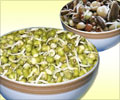Men who have a daily consumption of half a serving of soy food on average may have lower sperm concentrations than men who do not eat soy foods, says a new research.
Men who have a daily consumption of half a serving of soy food on average may have lower sperm concentrations than men who do not eat soy foods, says a new research.
The same effect was found to be much more pronounced in men who were overweight or obese.Led by Dr Jorge Chavarro, a research fellow in the department of nutrition at Harvard School of Public Health, Boston, USA, this was the largest study in humans to examine the relationship between semen quality and phytoestrogens (plant compounds that can behave like the hormone, oestrogen).
The researchers found that men who ate the most soy food had 41 million sperm per millilitre less than men who did not consume soy products. (The "normal" sperm concentration for men ranges between 80-120 million/ml).
Soy beans and soy-derived products mainly contain Isoflavones (daidzein, genistein and glycitein), which are plant-derived compounds with oestrogenic effects. The high consumption of isoflavones has been linked with infertility in animals, but so far there has been little evidence of their effect in humans.
After analysing the intake of 15 soy-based foods in 99 men who had attended a fertility clinic with their partners to be evaluated for sub-fertility between 2000 and 2006, the researchers asked them how often and how much they had eaten in the previous three months. The foods included tofu, tempeh, tofu or soy sausages, bacon, burgers and mince, soy milk, cheese, yoghurt and ice cream, and other soy products such as roasted nuts, drinks, powders and energy bars.
According to their intake of soy foods and isoflavones, the men were divided into four groups. After adjusting for factors such as age, abstinence time, body mass index (BMI), alcohol and caffeine intake and smoking, it was found that men in the highest intake category had, on average, 41 million sperm/ml less than men who did not eat soy foods.
"Men in the highest intake group had a mean soy food intake of half a serving per day: in terms of their isoflavone content that is comparable to having one cup of soy milk or one serving of tofu, tempeh or soy burgers every other day. It is important to highlight that the figure of half a serving a day is the average intake for men in the highest intake group. Some men in this group had intakes of soy foods as high as nearly four servings per day," said Chavarro.
Evidence was also found that the association between soy food intake and sperm concentrations were stronger in men who were overweight or obese (and 72pct of them were). They also found the relationship between soy foods and sperm concentration was strongest in men with the higher sperm concentrations.
"The implication is that men who have normal or high sperm counts may be more susceptible to soy foods than men with low sperm counts, but this remains to be evaluated," explained Chavarro.
Chavarro speculated that increased oestrogenic activity may have an adverse effect on the production of sperm by interfering with other hormonal signals. This effect could be strengthened further in overweight and obese men because men with high levels of body fat produce more oestrogen than slimmer men, leading to high overall levels of oestrogen in the body and reproductive organs.
The study was published online in Europe's leading reproductive medicine journal, Human Reproduction.
Source-ANI
SRM















